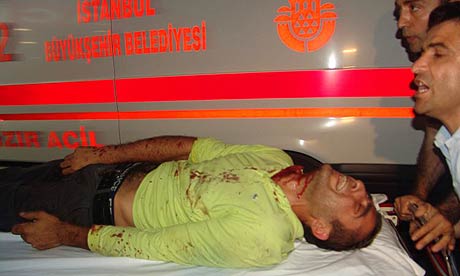15 killed and scores injured as bomb blasts hit Istanbul square
· Second device explodes amid panic of first attack
· Kurd separatists suspected of 'terrorist' street strike
- The Guardian,
- Monday July 28 2008
- Article history

An injured man is taken to hospital following the explosions in Istanbul. Photograph: AFP/Getty images
Turkey's political landscape was plunged further into turmoil last night when two bomb blasts rocked a packed pedestrian square in Istanbul, killing at least 15 people and injuring about 150 in what officials called a "terrorist" attack.
In the deadliest bomb attacks in the country for almost five years, the two explosions detonated within minutes of each other and a few metres apart, set off by devices in rubbish bins in a busy shopping street in Gungoren, a working-class neighbourhood in the west of the city.
The blasts underscored the divisions cutting through the country as a power struggle between secularists and the Islamist-leaning government comes to a head.
The ruling Justice and Development party (AKP) faces possible closure by the constitutional court for alleged anti-secularism in a hearing that begins today. Separately, 86 militant secularists were indicted last week for allegedly plotting to unseat the AKP in a violent coup.
The first blast happened at about 10pm local time near a telephone booth, causing a hail of flying glass and debris that left several people dead or wounded.
As crowds gathered to help the injured or to see what had happened, a second device went off near a car, killing and maiming more people.
"We know it is a terrorist attack, but which organisation is responsible - we don't yet have that information," said Hayati Yazici, the deputy prime minister. Early suspicion fell on Kurdish rebels, who have been responsible for countless bomb attacks over the past 25 years; Islamist radicals have also bombed targets in Turkey and attacked the US consulate in Istanbul less than three weeks ago.
TV footage last night showed several people on the ground apparently dead or severely injured in pools of blood.
"Tens of people were scattered around. People's heads, arms were flying in the air," Reuters quoted one witness as saying.
Police said the casualties from the second explosion were increased by the numbers drawn to the scene of the earlier blast. Another witness, Huseyin Senturk, who owns a shoe shop, said: "The first explosion was not very strong. Several people came to see what was going on. That's when the second explosion occurred and it injured many onlookers."
There was early speculation that the explosions may have been caused by a gas leak but Istanbul's governor, Muammer Guler, labelled them a "terror attack". He said the explosions had occurred within 10 or 12 minutes of each other, and that CCTV cameras had filmed the devices being planted.
"This was a heinous attack aimed against innocent citizens and the security of our people," Guler said.
"It did not discriminate between the young and the old, or men or women.There is no doubt that this is a terror attack. The fact that there was a crowd in the area has increased the number of casualties."
There was no immediate claim of responsibility, but Turkish TV quoted police sources as saying they had received intelligence of planned attacks by the outlawed Kurdistan Workers party (PKK), which has been blamed for previous incidents.
The Turkish army last week stepped up attacks on PKK bases in northern Iraq. More than 40,000 people have died in clashes between the army and the separatist PKK since 1984.
It was Turkey's second attack this month and the worst since November 2003, when 60 people were killed in Istanbul in four blasts, blamed on al-Qaida, at the British consulate, the HSBC bank's Turkish headquarters and two synagogues. Gunmen killed three police officers outside the US consulate in Istanbul three weeks ago before themselves being shot dead.
Turkey has kept up the pressure on Kurdish guerrillas in recent months and yesterday hit 12 separatist targets in northern Iraq's Qandil region.
The PKK uses northern Iraq as a base from which to fight for an ethnic homeland in south-east Turkey.
"The operations carried out as part of the anti-terror fight will continue with determination both at home and abroad in accordance with military necessities," the army statement said.

No comments:
Post a Comment